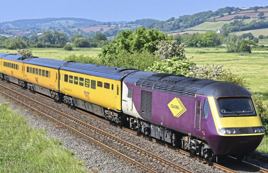Emerging technologies
Emerging technologies are increasingly adopted by businesses in all sectors. From distributed ledger technologies used in shipping, AI leveraged for logistics, and immersive technology utilised by manufacturing companies, a growing number of industries are recognising the importance of embracing new technology to keep up with global competition.
At Digital Catapult, we support businesses in every sector (including rail) to develop tech-enabled solutions that help them to overcome industrial challenges and achieve sustainable growth.
We are working with HS2 Ltd to deploy 5G solutions, manage assets remotely, and build an operational culture that uses data at the heart of its operations.
More rail companies need to embrace emerging technologies to improve their operational efficiency, cut costs, and improve service quality. Doing so can lead to optimised processes, streamlined operations, and a seamless business and customer experience - not forgetting to mention how new technologies such as digital twins can bolster rail companies’ sustainability credentials, too.
“Each business faces unique challenges, and while the collective efforts of rail companies contribute to a more sustainable global rail network, true progress begins at the individual level.”
Digital Twin technology holds immense value for the rail industry and has a significant impact on improving the competitiveness of the UK rail industry on a global stage. Digital twins enable the creation of virtual replicas of physical assets, allowing for real-time monitoring, analysis and optimisation.
While many Digital Twin technologies already exist, it is the combination of tools, capabilities, infrastructure and applications for specific use cases that will enable them to be exploited more quickly by the rail industry.
Digital Catapult is working with the Department for Science, Innovation & Technology to understand the potential value of and options for a UK capability in digital twinning and the wider cyber-physical infrastructure.
For rail companies that implement digital twins into their operations, it can lead to significant advantages such as improved operational efficiency, reduced downtime, and better maintenance practices - all of which lead to cost savings and increased productivity.
However, digital twins aren’t the only type of emerging technology to yield great results for rail companies, from both a competitive and sustainable perspective.
Quantum computing has the potential to transform optimisation algorithms which will enable rail operators to solve complex problems more efficiently and effectively. This can lead to improved scheduling, resource allocation and route planning, enhancing operational efficiency and reducing costs.
Moreover, IoT devices and sensors embedded into rail infrastructure can collect vast amounts of data in real-time. AI algorithms can also be analysed to identify patterns, predict maintenance needs, and optimise energy consumption - helping more rail companies to reduce the level of GHGs they emit, and to meet their environmental objectives.
The adoption of these emerging technologies will empower the UK rail industry to stay competitive while embracing sustainable practices and driving innovation, setting the UK apart from other markets.















Login to comment
Comments
No comments have been made yet.